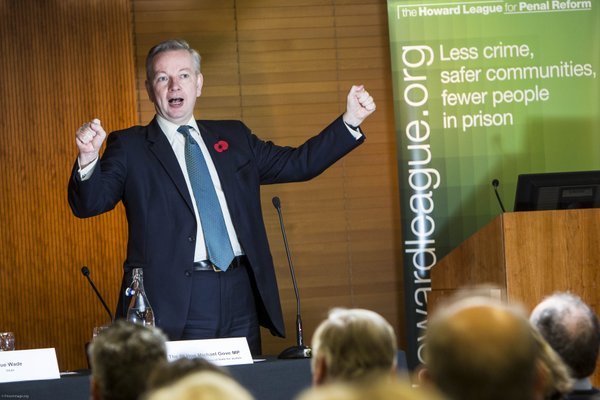[contextly_auto_sidebar]
 Addressing a meeting of the Howard League for Penal Reform last week, the Lord Chancellor and Justice Secretary, Michael Gove, set out the principles behind his plans for prison reform. Gove was eloquent, engaging and prone to employing an anecdote or rhetorical flourish – so much so that Frances Crook, the director of the Howard League, described herself as ‘blown away’ by the message Gove delivered.
Addressing a meeting of the Howard League for Penal Reform last week, the Lord Chancellor and Justice Secretary, Michael Gove, set out the principles behind his plans for prison reform. Gove was eloquent, engaging and prone to employing an anecdote or rhetorical flourish – so much so that Frances Crook, the director of the Howard League, described herself as ‘blown away’ by the message Gove delivered.
A recent profile of the Justice Secretary described him as ‘the politest man in politics’ and ‘an inveterate reformer, driven by a desire to change the world, rather than simply manage it’. With the legal aid budget subjected to damaging cuts during the last Parliament and repeal of the Human Rights Act perhaps complicated by opposition in the devolved regions and from within his own party, Gove appears to have seized on prison reform as an area of justice policy in which he can make his mark.
Justice with mercy
Gove has been given licence by the Prime Minister to focus on penal reform. In his speech to the Conservative party conference last month, David Cameron said:
‘We have got to get away from the sterile lock-em-up or let-em-out debate, and get smart about this. When prisoners are in jail, we have their full attention for months at a time – so let’s treat their problems, educate them, put them to work.’
Referring to Cameron’s intervention, the Justice Secretary caricatured what he sees as the two opposing approaches to penal policy in the past: on one hand, the belief that crime is a consequence of social and economic factors, and on the other hand the view that every criminal is an autonomous moral actor who understands the difference between right and wrong yet chooses to cross society’s moral boundary. Gove explicitly rejected both of these views:
‘People committing crime are making bad, wrong choices, but many are not autonomous moral actors – often they have grown up in conditions of moral and emotional poverty, as well as economic poverty.’
Gove stressed that ‘people in prison represent a full spectrum, but often are the children of damaged homes and the heirs to spiritual and emotional poverty’. He emphasised the need to ‘temper justice with mercy’ and asserted his belief that, of the tripartite purposes of confinement in prison – to incapacitate, to deter and to rehabilitate – the most important is rehabilitation.
While deterrents are important, Gove recognised that ‘some people who commit crimes are governed by impulsivity and are therefore not making a rational judgement’ for which criminal punishment can provide a deterrent effect. For Gove, when prison works properly, it can achieve three things:
- Education to provide opportunities to start afresh;
- Rewarding work which helps to instil important virtues; and
- The ability to foster strong relationships.
The treasure in the heart of every man
Gove praised prison officers who ‘put in the time to find what Churchill called the treasure in the heart of every man’. The Justice Secretary described the ‘incredibly moving’ sense of idealism he observed in conversation with a prison officer at HMP Manchester, which fortified his belief that ‘if the right ingredients are there, they can change lives’. He said this sense of idealism should be ‘at the heart of what we do in penal reform’.
The quality of education in prisons can, in Gove’s opinion, be improved by ‘giving those who lead our prisons a greater degree of autonomy’. If prison governors are given more say over who provides education and work, as well as the space to work with housing providers, charities and organisations like the Howard League, then positive change can be achieved.
Considering the challenges ahead, Gove said the government ‘was re-elected to deal with the deficit’ and that the causes for which anyone in his office will plead are ‘not always closest to the public’s heart’. Gove nevertheless called on the Howard League to hold him to the direction he outlined and, if possible, to ‘transcend the old divisions that used to bedevil the debate’ regarding penal reform.
Responding to a question from the audience, Gove said that ‘obviously [he] would like to see the prison population fall over time’ and that the best way to achieve that is through effective rehabilitation. Gove pointed out, however, that each individual decision taken about whether someone should be in prison is taken by the judiciary and it is not for him ‘to second guess the decisions of judges’, although he does ‘want to look at the whole sentencing framework’.
The prospect of body-worn cameras being used by prison officers was also raised, with Gove saying cameras can be ‘protection for the inmate and the officer’ because prison officers will be less likely to be assaulted and more likely to behave appropriately.
Law is a community, not just a marketplace
The first and only time in the evening that the Justice Secretary looked momentarily less composed was when a criminal solicitor at risk of losing her job due to legal aid cuts asked him about access to justice. Gove hesitated and initially stumbled over his words. He paused to regain his poise and said the government has ‘paused’ additional cuts which were planned. He acknowledged that ‘legal aid took some big cuts’ during the last Parliament.
Gove spoke about the proposed tax levy on major law firms, describing the legal system as ‘a community, not just a marketplace’, which means that ‘those at the top who do very well and benefit from that need to put something back’. How this is achieved is ‘a matter for discussion’, but any funds obtained will ‘need to be deployed to support Law Centres and legally-aided work’.
Concluding his speech, Gove said Ministry of Justice prison policy under his stewardship will be based on ‘evidence, reason, compassion and mercy’, as well as the belief that ‘every human life is precious, and we can transform lives if we have the patience, courage and tenacity to believe in change.’ If the Justice Secretary can deliver on this encouraging message, he may leave a legacy which could begin to justify his leader’s description of him as ‘the great Conservative reformer’.







